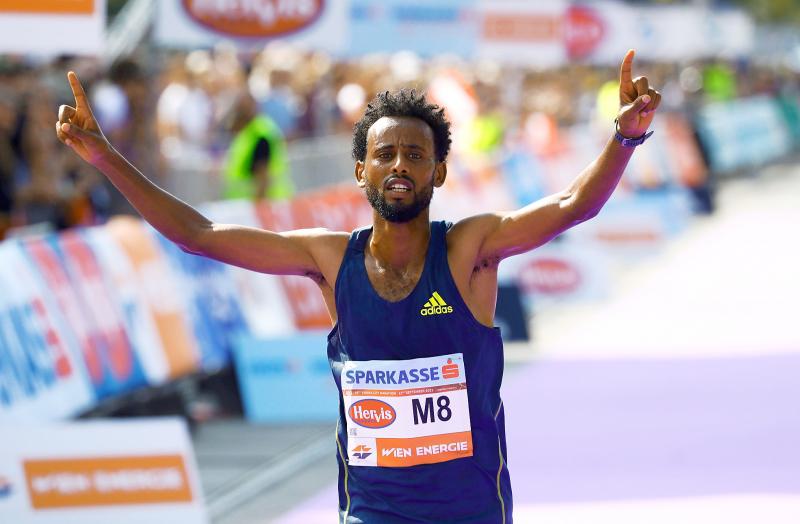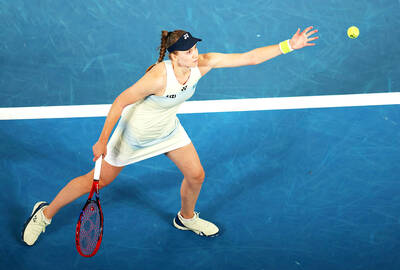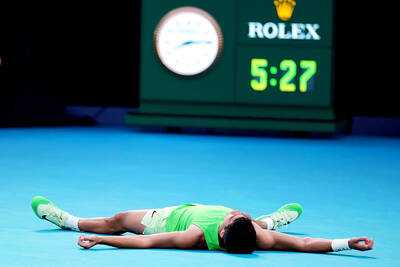Ethiopia’s Derara Hurisa on Sunday won the Vienna City Marathon, but was disqualified soon after when the soles of his shoes were found to be 1cm too thick in contravention of the rules.
Hurisa crossed the line with a time of 2 hours, 9 minutes, 22 seconds, but less than 45 minutes later was left distraught when his time was struck off as his shoe soles were 5cm thick.
The soles of road running shoes cannot be thicker than 4cm and Hurisa had worn a different set of shoes to the ones he had mentioned on his form.

Photo: Reuters
“We also stressed in the technical meeting the rules about the shoes. Unfortunately, we had no other choice than disqualifying the athlete,” race coordinator Hannes Langer said. “It’s the first time something like this has happened. I’m pretty sure that from now on there will be some form of checks to avoid something like this to happen again in a major race.”
Kenya’s Leonard Langat, who finished three seconds behind Hurisa, was declared the winner as a result.
“Of course I would have preferred to have broken the tape,” Langat said. “I had no clue about the disqualification until they told me. It was of course my aim to win, and I thank God that in the end I did.”
The race, usually scheduled for April each year, was held in tough conditions with many runners complaining of the extreme heat and the event was overshadowed by the death of a 40-year-old Australian participant in the half-marathon.

Nottingham Forest FC are to go into the Europa League play-off round after a 4-0 win over Ferencvaros TC on Thursday, while Celtic FC secured their place in the knockout phase with a victory over FC Utrecht. Aston Villa FC finished second in the league phase after recovering from two goals down to beat FC Red Bull Salzburg 3-2 with their spot in the last 16 already assured. Forest stood an outside chance of climbing into the top eight going into the final round of matches, but needed to beat Robbie Keane’s Ferencvaros and rely on other results going their way. Sean Dyche’s

HEATED RIVALRY: The pair had met 14 times previously, with Sabalenka winning eight of the encounters and entering the final as the favorite to take the title Elena Rybakina took revenge over world No. 1 Aryna Sabalenka to win a nail-biting Australian Open final yesterday and clinch her second Grand Slam title. The big-serving Kazakh fifth seed held her nerve to pull through 6-4, 4-6, 6-4 at Rod Laver Arena in Melbourne in 2 hours, 18 minutes. It was payback after the Belarusian Sabalenka won the 2023 final between two of the hardest hitters in women’s tennis. The ice-cool Rybakina, 26, who was born in Moscow, adds her Melbourne triumph to her Wimbledon win in 2022. It was more disappointment in a major final for Sabalenka, who won the US Open

Denver superstar Nikola Jokic returned from a 16-game injury absence to post a 31-point, 12-rebound double-double on Friday and propel the Nuggets to a 122-109 NBA victory over the Los Angeles Clippers. Three-time NBA Most Valuable Player Jokic had not played since suffering a bone bruise in the left knee he hyperextended in a game against Miami on Dec. 29 last year. The Serbian big man did not miss a beat. He led all scorers, connecting on eight of 11 shots from the field, and also handed out five assists with three steals while playing just 24 minutes, 32 seconds as the

BATTERED AND BRUISED: Alcaraz suffered a cramp in the third set, but was allowed treatment despite Zverev’s protests, and continued on to win in five-and-a-half hours An ailing Carlos Alcaraz battled past Alexander Zverev yesterday in five epic sets to reach his first Australian Open final and move within a match of becoming the youngest man to complete a career Grand Slam. The world No. 1 outlasted the German third seed 6-4, 7-6 (7/5), 6-7 (3/7), 6-7 (4/7), 7-5 over a titanic 5 hours, 27 minutes in hot conditions to head to tomorrow’s title match. He only narrowly avoided crashing out after a huge fright at 4-4 in the third set when he pulled up in pain with what appeared to be cramp. He was allowed to have treatment